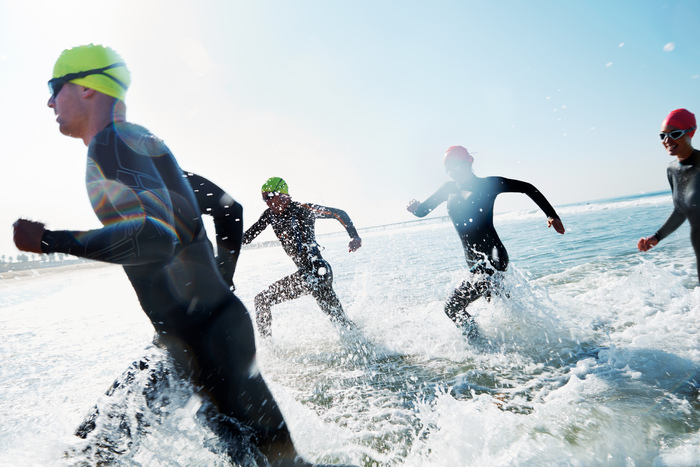Food as Fuel: Eating to Support Athletic Performance

I’m proud to say, this past weekend, I completed my first triathlon! What enabled me to complete this triathlon was not just training, but also giving my body the fuel it needed to train, compete, and recover. As I crossed the finish line, I remembered that my interest in Nutrition was originally sparked by sports and exercise — when I realized how interconnected they are. Athletes are biochemical machines!
Whether you’re a highly competitive athlete or someone who just enjoys your daily workout, I encourage you to consider the following guidelines to best support your physical performance and keep moving!
Consume Sufficient Calories
Carbohydrates should be the main source of the additional calories. When you increase your exercise regimen and the intensity, carbohydrate metabolism increases and becomes the dominant energy source. Although Nutrition is not an exact science, there are ways to estimate your daily calorie needs.
[twocol_one]
Your Activity Level
Little to no purposeful exercise
45–60 minutes most days
1–2 hours daily
Ultra Endurance training
[/twocol_one]
[twocol_one_last]
Calories/pound of ideal body weight
14–15
16–20
21–25
25–30+
[/twocol_one_last]
Be Strategic About What and When You Eat
To best support performance and recovery, focus on carbohydrates and protein. There is about a 30-minute “window of opportunity” following exercise where your muscles most efficiently use the protein and carbohydrates you ingest. Listen to your body initially as it may take some time for your gut to adapt to eating this way.
A general goal is to consume approximately 50–100 grams of carbohydrates after an exercise event with a small amount of protein (approximately 15–30 grams). For example, a large sweet potato with 2–3 ounces of chicken.
Daily Guidelines for Macronutrient Intake for Athletes:
Carbohydrates: Overall, aim for approximately 50–60% of your calories from carbohydrates (1 gram = 4 calories). The recommended amount will vary depending again on the length of exercise.
[twocol_one]
Hours/day of exercise
1
2
3
[/twocol_one]
[twocol_one_last]
Grams of Carbohydrates/kg of body weight
6–7
8–9
10–11
[/twocol_one_last]
Protein:
Aim for approximately 20% of your calories from protein (1 gram = 4 calories). More specific guidelines based on body weight are: 1.2–1.4 gram/kg for endurance athletes, and this can go up to as high as 2 grams/kg for marathon-like runs. For strength-based training and events, anywhere from 1.2–1.7 grams are recommended.
Fats:
Healthy fats should make up approximately 30% of calories, but best not to have them right before or after a workout or competition. 1 gram of fat provides 9 calories.
Ensure Adequate Hydration
For a person without much daily exercise, the typical rule-of-thumb is to drink half your body weight (pounds) in ounces. Filtered water, herbal teas, and fluid-based meals like soups and shakes all count as fluids.
For those with a daily exercise routine, check your weight before and after exercise a few times (without drinking during the workout) to get a sense of how much water you lose. Then replace that, as well. So, if you lose 2 pounds in a work out, be sure to drink an extra 32 ounces of hydrating fluid.
When you get into endurance or power workouts, you can’t count on thirst: dehydration can happen quickly and greatly affect performance. Try to start fully hydrated, drinking enough water that you can comfortable tolerate. A good guideline to follow is to start early in an event, and drink about 4–8 ounces of fluid every 20–30 minutes. 1 large gulp typically is an ounce.
Then, consider electrolytes — minerals that help regulate the intake of water and how water is balanced in and out of the cell. During an event or routine that is 30–60 minutes, plain water should suffice. Once beyond an hour or in hotter conditions:
- Try a sports drink or gel with your water that includes glucose and electrolytes. You lose more electrolytes the longer you sweat. You can lose as much as a gram of sodium for every 2 pounds of sweat (½ a teaspoon of table salt provides 1200 mg of sodium). Low sodium levels or hyponatremia can be very dangerous.
- Have salty snacks that you can digest during an event or a sports drink. Several products on the market provide a mix of electrolytes: sodium is the main one to focus on.
- You can also use salt tablets. Follow the guidelines recommended on the product, but typically one tablet per hour is the dosage. This may vary depending on the conditions. Be sure to drink plenty of water with these.
A word of caution: avoid products that contain high fructose corn syrup or any fructose. These tend to cause GI upset and will often just make dehydration worse!
When I was 12 years old, I started running competitively. Back then, my mother — a nurse who became a stay-at-home mom to cook (from scratch) for 7 kids — pointed out the importance of good nutrition if I were to continue to succeed in track and cross country. And, now, I have completed my first triathlon! Fortunately, a lot of research in the area of Sports Nutrition has better clarified the nutritional demands of the athlete. There is no one way of eating that works for everyone but the above guidelines are designed to give you a head start in understanding food as fuel to support your inner athlete.

